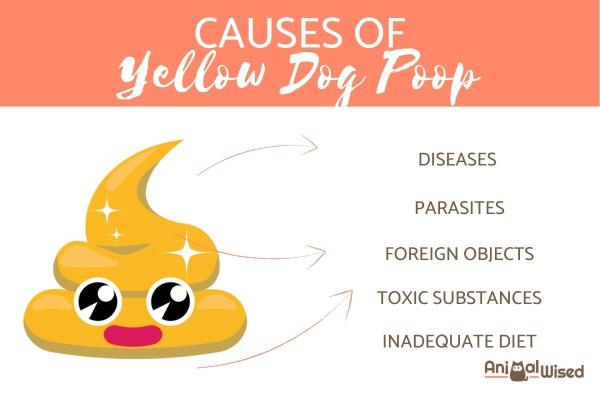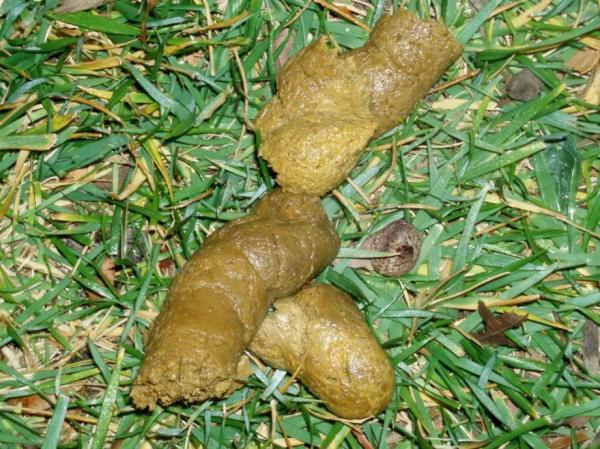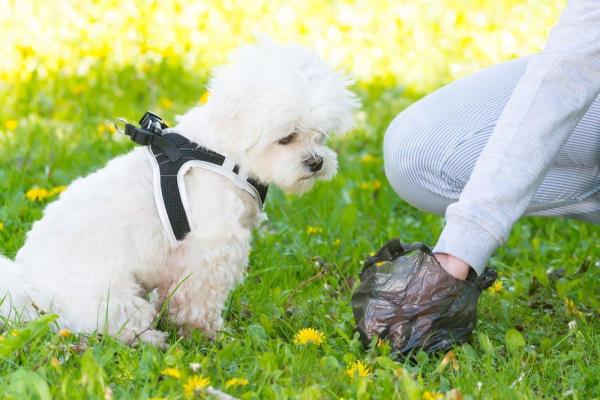
Collecting and disposing of our dog's poop is not the best part of being their guardian, but it is a necessary responsibility. It also provides us the opportunity to monitor their well-being since a dog's stool is an indicator of their general health. When the dog's stool is of a different consistency or color, it usually means there is a problem which needs addressed. The problems are not always gastrointestinal, although often they are.
In this AnimalWised article, we look at what it means when your dog has yellow poop. Yellow feces in a dog may be of varying consistencies and the cause of the yellow colour might not be the feces itself. For example, mucus in the dog's digestive system may be a yellow color.
Causes of yellow poop in dogs
It is important to know that a healthy dog stool might be a shade of light brown which looks a little yellow. However, there are problems in dogs which can lead to yellow poop. The main reason a dog has yellow poop is due to:
- Inappropriate diet
- Illness and disease
- Parasite infestation
- Eating something they shouldn't
Below we look at how these problems result in coloration of the dog's stools. We also go into detail about how this problem can be both treated and prevented.
Inappropriate diet
One of the most common causes of yellow feces in dogs is due to their diet. Not all dogs require the same food. There are various factors for this including:
- Age
- Underlying medical conditions
- Current state
- Size
We need to consider these factors when choosing what food to give to a dog. Older dogs will need food which helps support their joints, but which is less fatty since they do not exercise as much as younger dogs.
Even if the food we provide for our dog is quality commercial food, it may not be suitable for their given situation. The result may be that their stools turn a yellow color. When the dog has incorrect nutrition, it means they are not able to digest the correct nutrients. The result may be a change to their fecal color.
If your dog is a puppy with yellow poop, you will need to take them to the veterinarian. They may require tests to see if they have any nutritional deficiencies or other problems which may result in yellow feces. During the developmental stage, diet is particularly important to reduce chances of problems as an adult.
Older dogs will also need specific diets. A lifetime of digestion and other factors can take their toll on the dog's digestive organs such as the kidneys and liver. Liver problems are known particularly for affecting the color of the stool. Choosing a diet which will best prevent an older dog from have such issues. If your dog's poop is yellow, changing their diet may be the best way to treat the problem.

Illness and disease
Vomiting and diarrhea in dogs are two of the most common symptoms of disease in dogs. This doesn't only account for gastrointestinal diseases, but it does mean it has affect their digestion. When our dog has runny yellow poop, this type of diarrhea might mean there are certain specific diseases which lead to color change.
As stated above, yellow stool may be related to liver problems. Bilirubin is a substance which is produced by the normal breakdown of red blood cells. However, too much bilirubin may result in the liver being unable to process them. This could indicate a problem with the liver or with the red blood cells themselves.
When the dog has yellow mucus in their stool, it likely means they have an upset stomach. Although we may not have seen it, the dog may have vomited, making their stool less solid. Other causes of an upset stomach in dogs may result in yellow poop, but they often resolve quickly. If it continues, you will need to take them to a veterinarian.
Other diseases such as pancreatic insufficiency, inflammatory bowel disease and even a tumor can cause diarrhea and yellow poop. Many color changes of the dog's feces are temporary and will resolve on their own. However, we should always take them to the veterinarian to be sure.
Parasite infestation
Not all parasites in a dog's body will lead to disease. However, some will cause harm and many will affect the digestive system of the dog. The result might be yellow poop.
Some parasites which are most likely to cause a dog to have yellow poop include giardia or coccidia. They are protozoa that are installed in our dog's intestine and require more complicated treatments. Intestinal parasites in dogs can leech nutrients from the dog which causes the dog to have diarrhea or discoloration. Treatment will include antiparsitic medication such as Procox, as well as dietary changes and deworming.

Eating something they shouldn't
Although a poor diet is something the dog shouldn't be eating, we are referring to eating of foreign objects or hazardous material. When the dog eats something they shouldn't and it is not digested, it will appear in their stool (if it does not become stuck on the way down). This may cause there to be yellow in the dog's stool, but the poop itself might not be yellow.
When the dog eats something they shouldn't which contains yellow coloring, it may result in their poop being a yellow color. Food with lots of turmeric may cause this, but so too can materials they shouldn't eat. Yellow poop can be a sign of the dog eating something toxic, but there will likely be other signs of poisoning if the problem is serious.
This is something which can also cause a dog to have white stool.
What to do if your dog has yellow poop
When the vet has diagnosed the cause of the yellow stool, they will propose a treatment to improve your dog's digestion or combat the health problem that is resulting in the colored feces. When the cause of yellow feces in dogs is not a complicated disease, treatment may include the following:
- Deworming
- Change of diet
- Eliminate fiber
- Rehydrate the dog with fluid therapy
- Special medication
- Vaccines
Treatment will depend on the diagnosis, but it is very important to go to the vet to make sure that the state of health of our dog is optimal. There are many reasons why a dog might have blood in their stool also, some of which are considered a veterinary emergency.

Prevention of yellow poop in dogs
Since yellow stool in a dog is caused by problems affecting digestion, we should do all we can to avoid gastrointestinal problems. This means we should take the following precautions:
- Always give the dog plenty of clean, fresh water and avoid them drinking from puddles.
- Take care that their diet is quality and that it does not have any compound to which they are intolerant.
- Do not let them eat anything on the street or food that could them him.
- Keep an eye on the flowers and plants that you approach, to avoid eating any toxic plants for dogs .
- Visit the vet for regular checkups.
While yellow poop in dogs might signify a problem, not all pooping related canine activities are worrisome. Take a look at our video below to know more:

This article is purely informative. AnimalWised does not have the authority to prescribe any veterinary treatment or create a diagnosis. We invite you to take your pet to the veterinarian if they are suffering from any condition or pain.
If you want to read similar articles to My Dog Has Yellow Dog Poop, we recommend you visit our Other health problems category.